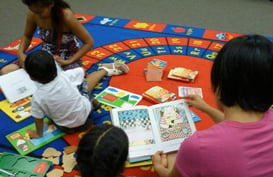The advancement of literacy is at the heart of library services and is a strategic service priority for the Houston Public Library (HPL). According to data from the Houston Center for Literacy, 1 in 5 residents in the Houston area lack basic literacy skills. To help address Houston’s high illiteracy rate, HPL is transforming its Carnegie Neighborhood Library into a premiere location for literacy services, resources and support. This location is now referred to as the Carnegie Neighborhood Library & Literacy Support Center (Center).
The Center is located in the near north side of downtown Houston, a high need community whose residents can immediately benefit from its presence and was strategically selected for that purpose. The service area for the Center includes a population where almost 46% of adults do not have a high school diploma, and almost 57% of its residents are unemployed. According to data from ProLiteracy, of the adults that don’t have a high school diploma, 61% of them don’t have access to the Internet. Equally daunting are estimates for the next decade that show nearly 80% of all jobs will require digital skills. A thorough community assessment of this neighborhood and the engagement of community stakeholders also revealed a strong need for intergenerational literacy support.
The Center will continue to provide full traditional library services that meet the critical information and programming needs of the community in the Carnegie service area. Additionally, HPL has extended public library service hours from 34 hours to 57 hours per week.
Significantly, this includes evening and Saturday hours, critical access times for the area population. In addition, the Library’s expertise in providing stellar early childhood, emergent literacy, and family literacy programs, including digital and workplace literacy programs, will be a major service component of the Center to help customers overcome the literacy divide.
The Center has goals to 1) Partner with leading local providers, such as Houston Community College and Literacy Advance Houston, and make available technology based adult education programs and services (ABE, GED, ESL, etc.) to the low literate members of the community; 2) Expand literacy education program and services curriculum to include integration of cutting edge technology tools in support of technology driven literacy programs and services, and 3) Increase digital literacy among targeted low literate participants in technology based adult literacy education programs.
These goals will be achieved through a targeted approach that involves:
- Collaboration with literacy stakeholders committed to innovative and comprehensive solutions to basic literacy for adults and their families through the provision of comprehensive literacy programming.
- Offering supplemental literacy materials, both in print and online, for in-house use or for borrowing for individuals and small nonprofit organizations focused on literacy education. The combination will provide an enriched environment for all types of learners and users.
- Dedicated literacy-trained staff that will be hired to manage the administrative and programmatic aspects of the Center and all staff will undergo sensitivity and cultural awareness training to ensure meaningful and measurable impact.

 Every time you purchase a book, we donate a book to someone in need.
Every time you purchase a book, we donate a book to someone in need.
